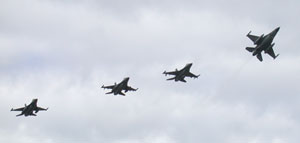‘All countries share a responsibility to combat bribery’, according to the OECD anti-bribery convention. But a bribery case in Hungary that has seen action in several other countries, but not Hungary itself, is testing that principle.
There is no obstacle stopping British or Swedish law enforcers who investigated the sale of fighter jets to Hungary sending their evidence to Hungary’s prosecution service and let the press and public know. But this is about as likely to happen as alien abduction.
Few would suspect how closely UFO sightings are linked to matters of transparency and corruption. UFO files are frequently released by the UK government under the freedom of information act. But in some countries no files are created on corruption cases. Often, the explanations concerning are much less credible than the ones related to flying saucers.
Hungary has signed the OECD Anti-Bribery Convention, meaning it has agreed to criminalise bribery of foreign officials. Its criminal code is amended accordingly. Businesspeople who bribe foreign public officials face severe penalties from an apparently well-functioning, well-resourced police and prosecution service.
Several countries investigated the jet sales…but not Hungary
 In 2001 Hungary entered into a lease-purchase agreement for 14 Gripen fighter jets. The British Serious Fraud Office started an investigation into the purchase, and charged Alfons Mensdorff-Pouilly, the agent of the planes’ manufacturer, BAE in connection with defence contracts the company made with several Eastern and Central Europe countries, including Hungary.
In 2001 Hungary entered into a lease-purchase agreement for 14 Gripen fighter jets. The British Serious Fraud Office started an investigation into the purchase, and charged Alfons Mensdorff-Pouilly, the agent of the planes’ manufacturer, BAE in connection with defence contracts the company made with several Eastern and Central Europe countries, including Hungary.
As part of the deal, Hungary signed an offset agreement to purchase Swedish investments worth 110% the value of the arms deal.
The SFO case notes stated:
Alfons Mensdorff-Pouilly, between 1 January 2002 and 31 December 2008, conspired with others to give or agree to give corrupt payments to unknown officials and other agents of certain Eastern and Central European governments, including the Czech Republic, Hungary and Austria as inducements to secure, or as rewards for having secured, contracts from those governments for the supply of goods to them, namely SAAB/Gripen fighter jets, by BAe Systems plc.
The story has been widely covered by the media. But it is worth looking at the paranormal activities of the various national authorities in this case.
This case of high level corruption involves at least six OECD member states for different reasons.
- The UK, US and Sweden – where the companies who manufactured the fighter jets come from.
- Austria, Czech Republic and Hungary – the purchasing countries.
What did they do?
Countries whose arms industry would have actually benefited:
- The authorities of the United Kingdom investigated the case. Hungarian authorities assisted them. But instead of prosecuting anyone, they reached a settlement with the BAE. In the US something similar happened.
- They did, however, charge an agent for bribing unknown Hungarian officials and later made a settlement with BAE which in theory should not have any effect beyond its jurisdiction, but in fact it prevents the authorities of other countries from obtaining essential evidence to hold criminals accountable.
- The Swedish authorities had started to investigate, the evidence they needed was no longer available once the UK settlement closed the criminal procedure. They said they were willing to share data with the Hungarian public prosecutor, but they never asked, to everyone’s great surprise.
Countries that face the consequences of corruption:
- In Austria and in the Czech Republic there are ongoing investigations, the latter ones even met Swedish counterparts to obtain evidence. The Czech Gripen investigation also involves the Hungarian authorities.
Bribery needs at least two parties, bribe giver, and taker
So the only mystery is in Hungary, the only end of the Gripen deal not investigated.
Mensdorff-Pouilly was charged and investigated in several countries with both offering and giving bribes, but according to the understanding of Hungarian authorities no one has received the bribe – and this is really supernatural; a bribery which is visible from the Western side of the Austrian-Hungarian border, but unfathomable from Hungary.
Had the Hungarian authorities detected something abnormal, such as the decision-makers changed their mind overnight when they finally opted for the Gripen jets instead of F-16 or when Hungary signed the offset agreement which promised to bring Swedish investments to Hungary worth 110% of the value of the arms deal, without any prior assessment of present and planned Swedish investments, they could have investigated the case. Unfortunately they found nothing suspicious in this case.
Under international law when a state is “unwilling or unable genuinely to carry out the investigation or prosecution” international bodies take over this role. Is it time for the International Criminal Court to tackle high level corruption?















 Connect with us on Facebook
Connect with us on Facebook Follow us on Twitter
Follow us on Twitter